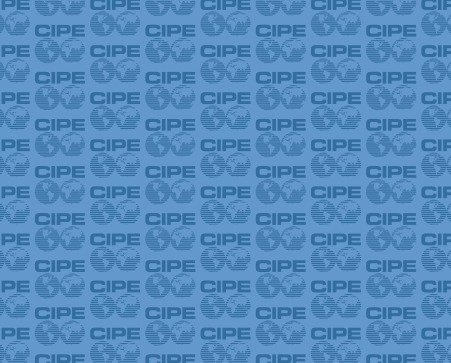 We talk a lot about democracy working between elections; about the importance of people being able to express their views and opinions beyond the ballot box. But while its easy to talk about democratic governance, its not as easy on the practical level. How do you engage citizens in holding officials accountable? How can small entrepreneurs ensure that political leaders live up to their electoral promises?
We talk a lot about democracy working between elections; about the importance of people being able to express their views and opinions beyond the ballot box. But while its easy to talk about democratic governance, its not as easy on the practical level. How do you engage citizens in holding officials accountable? How can small entrepreneurs ensure that political leaders live up to their electoral promises?
Although possible, it is extremely difficult for individuals to achieve such a task. We have seen, however, that building a platform of a collective voice is one of the most effective ways of getting involved and participating in the act of democratic governance – in holding public officials accountable for their promises and actions.
We have facilitated such a process in Moldova – engaging small business in democratic governance via the National Business Agenda program. Through this effort, small businesses come together, identify issues of concerns, and engage government in a constructive ways to move the economy and society forward.
In seeing their policy proposals accepted and implemented by the government, the Moldovan business community has gained a new faith in the democratic process. It was a major achievement to participate in the democracy process and make it work, especially among some voices that were quite skeptical of the prospects. Most importantly, these small business owners begin to see themselves not only as “recipients” of laws and regulations, but also as “creators” – for them, democracy means not only free elections, but also active participation.
Some of their quotes are quite inspiring:
“For the first time in my life, I felt that the power didn’t belong to one single person. We have earned small fiscal victories. Entire fragments in the business advocacy agenda were adopted within the government’s Governance Program. I felt that we govern, too, not just the authorities” (Tatiana Grinic, member, Association of Professional Accountants and Auditors in the Republic of Moldova)
“Our problems were structured in an Agenda and our ideas were supported by everyone. This is not lobby, but advocacy […] The business community used to communicate only with top-level public authorities but we have also included middle-level authorities. Since we have the national business agenda process in Moldova, fiscal and customs agents have been addressing business in a different, more cautious manner.” (Ion Lesanu, Executive Director, “Timpul” Business People’s Club).
“The Agenda can show the human face of business.” (Eugenia Ganea, Program Coordinator, National Federation of Employers in Agriculture and Food Industry)
“The National Business Agenda is in fact the businesses’ proposition for Moldova” (Igor Krapivka, President, “Timpul” Business People’s Club).
Published Date: October 29, 2010